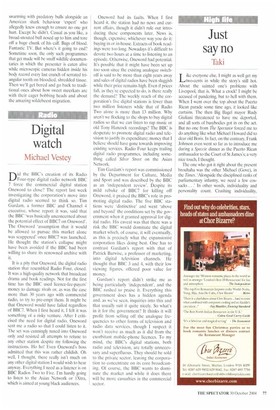Digital watch
Michael Vestey
Did the BBC's creation of its Radio Four-type digital radio network BBC 7 force the commercial digital station Oneword to close? The report last week investigating the corporation's move into digital radio seemed to think so. Tim Gardam, a former BBC and Channel 4 executive, whose report it was, said that the BBC 'was basically unconcerned about the potential effect of BBC7 on Oneword'. The Oneword 'assumption that it would be allowed to pursue this market alone was scuppered' once BBC7 was launched. He thought the station's collapse might have been avoided if the BBC had been willing to share its renowned archive with it.
It is a pity that Oneword, the digital radio station that resembled Radio Four, closed. It was a high-quality network that broadcast drama and book readings. Not for the first time has the BBC used licence-fee-payers' money to damage rivals or, as was the case more than 30 years ago with commercial radio, to try to pre-empt them. It might be that Oneword would have failed regardless of BBC7. When I first heard it, I felt it was something of a risky venture. After I criticised the need for digital radio, Oneword sent me a radio so that I could listen to it. The set was cunningly tuned into Oneword only and resisted all attempts to retune to any other station despite my following the instructions. Ho ho! Even Oneword's boss admitted that this was rather childish. Oh well, I thought, there really isn't much on any other digital station I would wish to hear anyway. Everything I need as a listener is on BBC Radios Two to Five. I'm hardly going to listen to the Asian Network or 1Xtra, which is aimed at young black audiences.
Oneword had its faults, When I first heard it, the station had no news and current affairs, though it didn't rule out introducing these components later. News is, though, expensive, whichever way you do it: buying in or in-house. Extracts of book readings were too long. Nowadays it's difficult to devote two hours at a time to listening to an episode. Otherwise, Oneword had potential. It's possible that it might have been set up too soon since the existing analogue switchoff is said to be more than eight years away and sales of digital radios have been sluggish while their price remains high. Even if prices fall, as they're expected to do, is there really the demand? The weekly reach of the corporation's five digital stations is fewer than two million listeners while that of Radio Two alone is more than 13 million. Why aren't we flocking to the shops to buy digital radios so that we can listen to rap music or old Tony Hancock recordings? The BBC is desperate to promote digital radio and television to justify its expenditure; money that I believe should have gone towards improving existing services. Radio Four keeps trailing digital radio programmes, including something called Silver Street on the Asian Network.
Tim Gardam's report was commissioned by the Department for Culture, Media and Sport and was described by the BBC as an 'independent review'. Despite its mild rebuke of BBC7 for killing off Oneword, it praised the BBC's role in promoting digital radio. The five BBC stations were 'distinctive' and went 'above and beyond' the conditions set by the government when it granted approval for digital radio. His caveat was that there was a risk the BBC would dominate the digital market which, of course, it will eventually, as this is precisely what the expansionist corporation likes doing best. One has to contrast Gardam's report with that of Patrick Barwise, a professor of marketing, into digital television channels. He thought that BBC 3 and 4, with their low viewing figures, offered poor value for money.
Gardam's report didn't strike me as being particularly 'independent', and the BBC rushed to praise it. Everything this government does has a hidden agenda and, as we've seen, inquiries into this and that usually suit it quite nicely. So what's in it for the government? It thinks it will profit from selling off the analogue frequencies to other forms of television and radio data services, though I suspect it won't receive as much as it did from the exorbitant mobile-phone licences. To my mind, the BBC's digital stations, both radio and television, are totally unnecessary and superfluous. They should he sold to the private sector, leaving the corporation to concentrate on its core broadcasting. Of course, the BBC wants to dominate the market and while it does there will be more casualties in the commercial sector.


















































































































 Previous page
Previous page